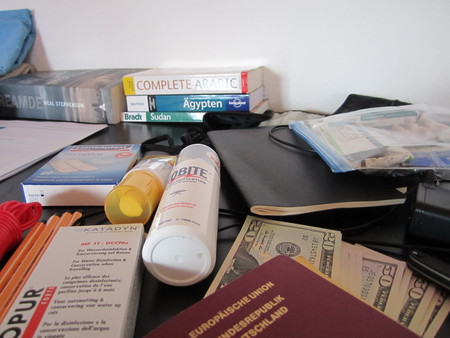Travelling up the Nile
I'm so excited! Tomorrow afternoon, together with a good friend of mine I'll board a plane to Cairo, Egypt. There, we'll try to acquire visas to enter Sudan. Essentially, we will travel up the river Nile from Cairo via Aswan, Wadi Halfa, and Atbara to Khartoum. If we have time, we'll also visit Port Sudan. In total, we have six weeks of time on our hands.
I hope I'm prepared well: I've been learning a bit of Arabic at university for the past two semesters; also, I've been reading the Sudan Tribune the past few months to stay up to date about the situation there. – Other than that, it's the usual stuff you should bring: insect repellent, anti-malaria tablets, water purifier, sunblocker, a good book and a (paper) notebook. Oh, and they don't have ATMs in Sudan, so it's all cash. Better hide it well. (Correction: There are no ATMs for international CCs like Master, Visa oder AmEx. For the local banks, there are quite a few.)
I had to cut down on my initial travel plans, which would have led from Cairo to Dar es Salaam (via Khartoum, Juba, Kampala), crossing five countries in total. This is not feasible any more, however, due to the high tension and violence in Southern Sudan (especially in the Abyei region). – On the upside, it'll be a rather relaxed journey now!
In Khartoum it's 36°C right now... – See you in April!
Linkdump
Al-Jazeera-Linkdump:
- Die USA setzen nun auch in Somalia Dronen ein
- "By 2030, 47 per cent of the world’s population will be living in areas of high water stress" und viele weitere interessante Fakten über aufziehende Wasserkriege
- Gutes Feature mit div. Artikeln zum Thema Struggle over the Nile
- Marokko hat eine neue Verfassung: Die Regierung erhält exekutive Befugnisse, aber der König ist immer noch "heilig". Außerdem werden Berbersprachen (zB. der Tuareg) neben Arabisch offizielle Sprache.
- Interessante, aber schon ältere Zusammenfassung, was für Aufstände die Revolutionen im arabischen Raum in Subsahara-Afrika getriggert haben
- Der vom Internationalen Strafgerichtshof angeklagte Präsident des Sudan wird in China empfangen und bereitet erst mal den Weg, mehr Rohöl (das wohlgemerkt zum Großteil aus dem Süden des Sudan kommt!) nach China zu exportieren.
Ägypten und der Nil
Der Nil zieht sich wie ein grünes Band durch Ägypten. Fraglos profitiert Ägypten von allen acht am Nil anliegenden Ländern momentan am meisten vom Nil, nicht zuletzt ob des gigantisch ausgedehnten Nil-Deltas. Diese Acht Länder haben sich Ende der Neunziger zu der Nil Basin Initiative zusammengeschlossen, doch die Stimmung ist alles andere als gut:
Representatives of upstream countries [Rwanda, Uganda, Kenya and others] said they were "tired of first getting permission from Egypt before using river Nile water for any development project like irrigation", as required by a treaty signed during the colonial era between Egypt and Britain in 1929.
Fefe verlinkt auf ein interessantes Interview, der auf die Tatsache hinweist, dass Ägypten in den kommenden Jahren unter massiver Wasserknappheit leiden wird. Das geht auf eine Vertragsunterzeichnung Burundis letzte Woche zurück:
Burundi has now joined Uganda, Rwanda, Tanzania, Ethiopia and Kenya in agreeing to the deal, which seeks to strip Egypt of its long-held rights to the Nile.
Wie krass sich die Situation daher für Ägypten (und besonders die großen Städte am Nil-Delta) zuspitzen wird, kann man daran erkennen, wie sehr sich die Ägypter momentan am Nilwasser bedienen:
Egypt’s 80 million inhabitants draw about 90 percent of their water needs from the Nile. Cairo maintains that, even by the favourable terms of current agreements, its water needs cannot be met by the Nile alone after 2017.
Es gibt so gut wie keine Ägypter, die nicht auf den Nil angewiesen sind:
[T]he Nile Valley and Nile Delta are the most important regions, being the country's only cultivable regions and supporting about 99% of the population ...
Wenn dieser Vertrag von den Ländern stromaufwärts ratifiziert wird, dann könnte das gut die Grundlage des ersten ernsthaften und in aller Öffentlichkeit ausgetragenen Wasserkrieges werden. – Im Gegensatz zu Gaza und der West Bank, wo die Intention Israels, den Palästinensern die Wasserzufuhr abzuschneiden, häufig vernachlässigt wird.
